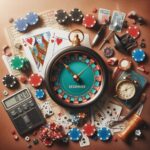In the world of casino poker, Emotions in Casino Poker success hinges not just on the cards you are dealt, but on your ability to manage emotions and maintain a “poker face.” Mastering the art of emotional control is crucial for any poker player looking to play seriously and profitably. This article delves into the strategies for managing emotions at the poker table, providing insights into how to keep a cool demeanor, make rational decisions, and read the emotional cues of others to gain a competitive edge.
Understanding the Importance of Emotional Control
The first step in mastering your poker face is understanding the role emotions play in poker. Emotions like frustration,Emotions in Casino Poker excitement, and fear can cloud judgment, leading to poor decision-making and strategic blunders. The ability to control these emotions, and by extension, your facial expressions and body language, is what often separates the amateurs from the pros.
Developing a Poker Face
A true poker face goes beyond merely hiding your emotions. It involves presenting a demeanor that is consistently neutral, giving no clues to your opponents about the strength or weakness of your hand. This can be practiced in everyday situations, Emotions in Casino Poker not just at the poker table. Try to keep a calm and neutral expression when discussing different topics, and observe how people react. The more you practice, the more natural it will become to maintain this demeanor during a game.
Techniques for Emotional Regulation
- Deep Breathing: Simple breathing techniques can help maintain calm and reduce stress levels. Before each hand, take a few deep breaths to center yourself and clear your mind.
- Mindfulness and Meditation: Regular practice of mindfulness and meditation can improve your ability to detach from immediate emotional responses. By fostering a sense of “presentness,” these practices help you stay focused on the game and less reactive to good or bad plays.
- Cognitive Behavioral Techniques: These involve recognizing the specific thoughts that trigger emotional responses and restructuring them to be more rational and less emotional. For example, if losing a hand makes you feel angry or upset, you might remind yourself that variance is part of the game and that every loss is an opportunity to learn.
Reading Opponents’ Emotions
While mastering your own poker face, it’s equally important to read the emotional states of your opponents. Look for non-verbal cues such as changes in posture, hand movements, facial expressions, and even patterns of play that may indicate confidence, nervousness, or bluffing. Over time, collecting these emotional reads can become an invaluable part of your poker strategy, allowing you to make more informed decisions about how aggressively to play or when to fold.
Handling the Ups and Downs
Poker can be a rollercoaster of emotions due to its unpredictable nature. Handling the highs and lows with grace is key to long-term success. Develop a routine for both winning and losing—whether it’s taking a short walk after a big loss or having a specific way to celebrate a win, keeping your emotional responses in check will help maintain your poker face and your focus.
Implementing Emotional Strategies in Game Play
When you sit down at the poker table, it’s essential to have a clear strategy not just for playing cards but also for managing your emotional state throughout the game. This might mean setting specific goals for each session, such as focusing on remaining calm after a bad beat or ensuring you don’t get overly confident during a winning streak.
Conclusion: Cultivating Your Poker Edge
Mastering emotions and maintaining a poker face are skills that require practice and dedication. By using the techniques discussed, players can cultivate an emotional resilience that will serve them well in the high-stakes environment of casino poker. Remember, the ability to control emotions is not just about hiding feelings; it’s about enhancing overall mental clarity and decision-making prowess at the table, giving you the edge needed to turn the odds in your favor.


